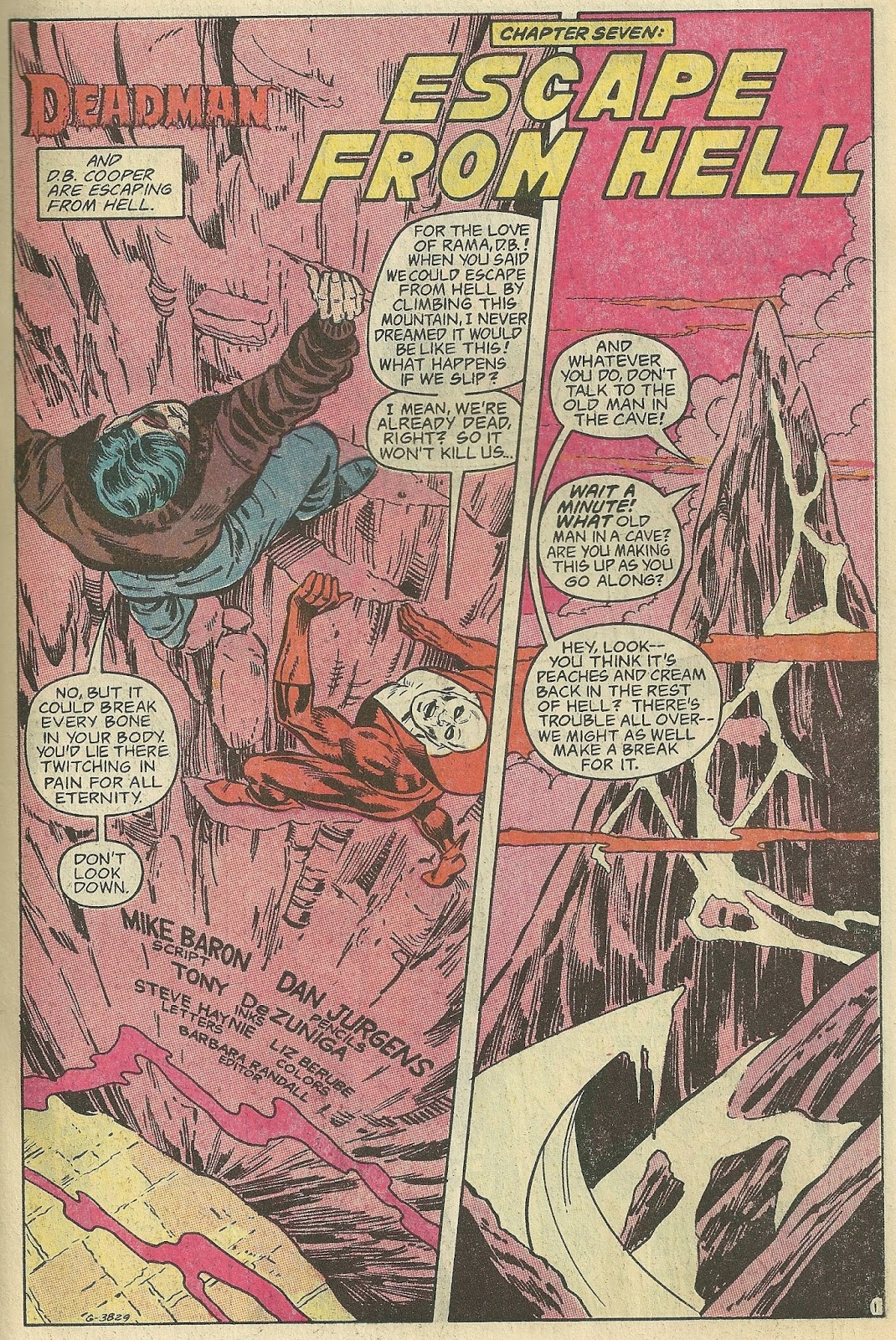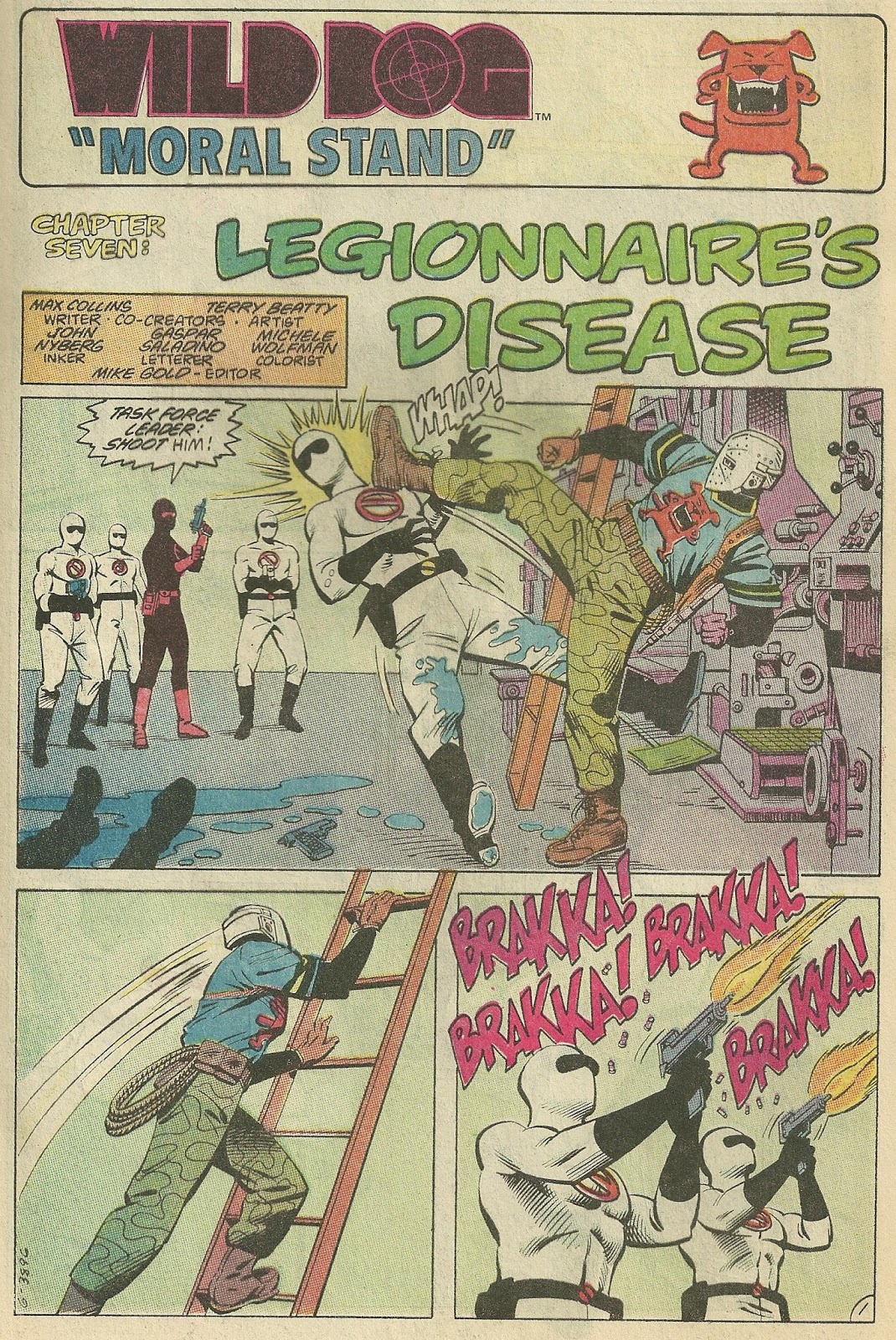In 1988-89, DC changed Action Comics from a monthly Superman-focused series to a weekly anthology, also changing its name to Action Comics Weekly. It lasted 42 issues before reverting to a monthly format. I am going to review all 42 of those issues, one per week for 42 weeks. This is the seventh of those reviews.
I found this issue rather dry. All the stories felt like they were spinning their wheels a bit.
I can't decide if I love or hate that Hal Jordan books himself on Oprah. I always find it weird when real celebrities get used in fiction, though it can work if there's a reason for it. In this story, I feel like Oprah could've been any talk show host, so I wasn't crazy about her inclusion. I'm assuming she'll be back next week when we see Hal actually go on the show, so we'll see how that goes, but I wouldn't exactly say I'm looking forward to it. Beyond that, this issue is mostly recap, with Hal flying around the globe remembering things that have happened in this comic's previous issues. He then discovers that, due to the bad publicity surrounding his recent run-ins with Star Sapphire, he is feared and hated all over the world, everyone now believing Green Lantern is a murderer. This fact, along with a playful suggestion from Arisia, inspires Hal to call Oprah in an effort to clear his name, and hopefully get John Stewart out of jail. The concept of a superhero using P.R. as a tactic is something I feel like I've seen a lot of recently, so kudos to this story for being ahead of the curve, but it doesn't actually happen here, we just get told that it's going to happen. Nothing much happens here at all, is the problem, the whole eight pages being either regurgitated information or set-up for upcoming events. The headline is really that Gil Kane has been replaced by Tod Smith for some reason, and I'm sad to see Kane go. Smith delivers a good-looking issue, and his style isn't too distant from Kane's, but there is definitely some energy missing from the artwork. It's missing from the script, too, making this an altogether low-energy affair, which is a particularly bad way to kick off any anthology.
Turns out D.B. Cooper isn't D.B. Cooper, but the Sensei—Deadman's murderer from when he was alive—in disguise. I guess that pretending to be Cooper is a tactical decision, posing as a famous person to throw off suspicion, but I have to question once again why Cooper of all people was chosen. Considering he acts as a guide for Deadman to get out of Hell, some recognizable explorer or adventurer would've made way more sense, and Cooper just seems like an arbitrary call. We don't even know if he's dead in the real world, right? Not positively. It's minor but it really bugs me. Meanwhile, this Deadman narrative keeps jerking me around, though at least the focus is still on Deadman escaping Hell. By bringing in the Sensei, it does change from a self-contained story to one pulling more heavily from Deadman's continuity, and it also highlights the thing I think has been troubling me all along about the Deadman sections that I have tried but mostly failed to articulate precisely: the conflict changes every week. Though there is a forward momentum to the narrative that makes it all one thing, each week sees Deadman facing a different threat/villain. The reader gets no chance to root against anyone for very long, or to care about Deadman accomplishing anything because he always does it so quickly and then it gets replaced by the next thing right away. The Sensei revealed himself and I felt nothing about it, because it was just one more new obstacle I knew would be disposed of post-haste. I was right. Though it's not very often the worst individual part of any issue of Action Comics Weekly, I think I'm most eager for this Deadman story to be resolved and swapped out for some other character.
Wild Dog continues to do its usual thing, and I continue not to be into it. This time around, there is that classically frustrating action cliché of the hero who cannot be hit by bullets no matter how many get fired at him, but then turns around and hits the bad guys immediately. A very weak piece of storytelling there. Other than that, it's just a bunch of the typical violence, and then we learn that Wild Dog's old college friend and current local newspaper reporter Lou Godder has known his secret identity for a while, which is significant I guess but doesn't really feel like a shock, as even Wild Dog's reaction is fairly understated. My favorite thing about Wild Dog this week was the mistake in the page above. You'll notice that the head of the Legion of Morality team has the line, "Task force leader: shoot him!" which makes no sense because is the task force leader. Also, last issue that same guy just said, "Shoot him!" So I'm guessing this is a situation where letterer Gaspar Saladino saw the script and accidentally included the name of the character in his dialogue, a mistake which editor Mike Gold then missed. It took me a few seconds of blank staring to figure that out, and once I did it genuinely amused me, something Wild Dog has failed to do much before now. Of course, for an error to be what I liked best about the story is not a good sign, but at least this was no worse than usual; it as exactly as uninteresting as I expected it to be.
I've always been attracted to this story in part because it's a mystery, and Superman isn't usually a mystery-solving type of hero in my mind. He comes from Action Comics, while Batman comes from Detective Comics, and to me that's always been kind of the key difference between DC's two most well-known characters. That said, I found myself having an "Oh, right..." moment when reading the part in this story where Supes refers to himself as, "The Daily Planet's top investigative reporter." Because, yeah, of course Superman is equipped to solve a mystery, since that kind of thing is what he does in his day job constantly. It brought Superman and Batman a bit closer, and underlined for me an important set of skills and resources Superman has access to that, for whatever reason, I've always more or less ignored in the past. Just getting to that point was almost half of the story this week, with the back half being Superman finding the name of the man who blew himself up a few issues back, Charles Culpepper, then learning that Culpepper is supposed to have died that same morning somewhere far away from where Superman actually saw him die. It thickens the plot by demonstrating the true reach of whoever was behind Culpepper's suicide and the mugging that set it off—if the primary villain can so quickly change the story of how one of his/her agents died, then he/she must have some significant pull. Roger Stern continues to add a bit more spice to the narrative recipe every week, even with his two-page limit, and though the progress was minimal here, it served to point out an aspect of Superman's character for this particular reader that I never previously gave any real consideration.
Sadly, the reveal of who the intruder was from last issue held no surprise. It was Rafael di Renzi, who I suppose it basically had to be, but I was hoping to see someone unexpected underneath his mask. He tells his backstory to the new Secret Six, explaining how his father Carlo was forced to work for Mockingbird in order for Mockingbird to keep providing the pills that keep Rafael's bone disorder in check. In other words, Carlo did it for his son, so now his son is trying to do something for him by figuring out the truth behind the plane crash that supposedly killed off all the old Secret Six. Many of the specifics of Rafael's story were new information, but the broad strokes were all well-established, so this wasn't the most interesting installment. It was important for Rafael and the current Secret Six to transition from enemies to allies, and that got accomplished in a believable and efficient fashion, but it meant explaining to the Secret Six a few things the reader has known for a while now. I did enjoy how their next mission was also introduced; Martin Pasko has done a good job of keeping more than one ball in the air at a time in this story, and keeps it up here. The idea of the team going after a corrupt meat-packing plant isn't all that gripping, but I do like how Mockingbird's whole deal seems to be ending corporate dishonesty, holding businesses accountable for the damage they cause and exposing them when they lie or cut corners in a way that hurts innocent people. That's an interesting focus for a vigilante to have, so I'm curious to see what other types of enemies this group might face in the long run. For now, having them and Rafael working together is bound to complicate things, and with those characters finally together, it's harder than ever to predict where this story is headed.
As I mentioned up top, this issue was perhaps the least exciting yet on the whole, but the Blackhawk section was the exception that proved that rule. Cynthia Hastings finally reveals that she's not just seeking Red Dragon's gold but a specific item within the collection, Massie shows exactly what a scumbag and villain he truly is, and then Massie and Blackhawk finally get to have an all-out brawl before Red Dragon shows up to put everybody's lives at risk. It's a lot of development and peak-reaching back-to-back, with some tight action from Rick Burchett and Pablo Marcos, colored perfectly in brash oranges, reds, and blacks by Tom Ziuko. At the end, we're promised that next week will be this story's finale, which makes sense considering there's not a lot left to do. The gold is on Blackhawk's plane, Cynthia has shown her hand, and that in turn has caused both Massie and Blackhawk to show theirs. With the cards fully on the table, Red Dragon seems to be in a super-advantageous position, and considering the isolated location, our heroes are in a tense, apparently impossible situation. Mike Grell got us to this point at a quick but steady pace, and he's done a pretty amazing job of developing the cast along the way, so that I'm legitimately curious as to how this will shake out for all four people, invested in their outcomes equally. I want different things for each of them, and I wholly despise Massie whereas I like the others to different degrees, but I care about them all, which is what matters most. While I hold out hope that Deadman and Wild Dog will wrap up ASAP, I'm bummed to know Blackhawk is on its way out. It's been reliably entertaining, and it's perhaps the most unlike any of the other stories in this book.
In conclusion, here are all the stories from this issue, listed from worst to best:
6. Deadman/"Escape from Hell"
5. Wild Dog/"Moral Stand Chapter Seven: Legionnaire's Disease"
4. Green Lantern/"Guilty!"
3. Secret Six/"Gino"
2. Superman/"Familiar Face?"
1. Blackhawk/"Another Fine War Chapter 7"








No comments:
Post a Comment